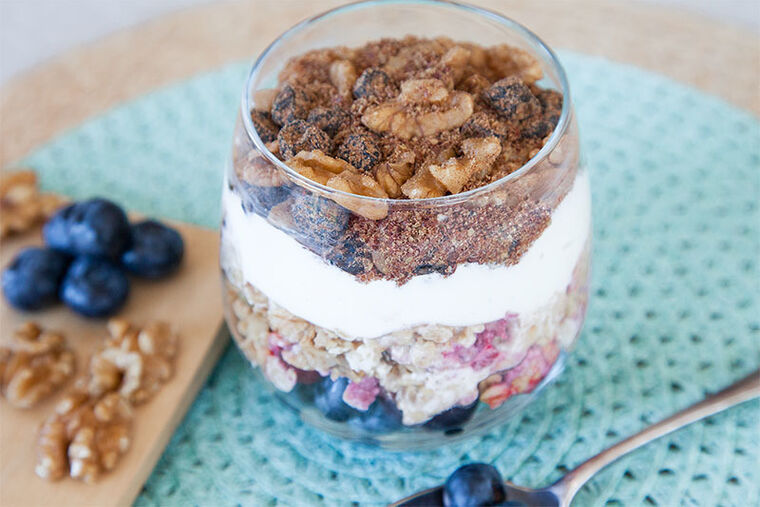This Breakfast Brain Topper is low in sugar and, with the good fats in linseeds and walnuts, it will help give your brain a morning boost.
- B Breakfast
- DF Dairy free
- GF Gluten free
- Ve Vegan
- VG Vegetarian
- S Sweet
- HH Heart-healthy
- Prep time 2 mins
- Serves 1
- Difficulty easy

Method
- Combine ground linseeds with cinnamon.
- Add walnuts and dried blueberries (if using fresh or frozen berries instead of dried, add when serving).
- Serve on top of porridge, yoghurt or ricotta, or your favourite muesli.
Tip: If not used immediately or if a larger quantity is made, it can be stored in an airtight jar in the fridge for up to 2 weeks.
Nutritional information
By Jean Hailes naturopath and herbalist Sandra Villella
Eating breakfast is associated with better mental function and performance, and is linked to a small advantage for memory, especially delayed recall. Research also shows that a low-GI (glycaemic index) breakfast may be more beneficial, especially for people with impaired regulation of their blood sugar.
This Breakfast Brain Topper is low GI and, with its linseeds and walnuts, focuses heavily on the omega-3 fatty acids, which help to control inflammation and oxidation (brain oxidative processes contribute to age-related cognitive decline).
Evidence suggests that omega-3s can have protective effects on the ageing brain. High intake of omega-3 fatty acids are also associated with better performance on tasks of memory.
Walnuts are also one of the beneficial components of the Mediterranean diet. This diet is rich in antioxidant-rich foods in general – and of the plant compounds called polyphenols in particular – so might help counteract age-related cognitive decline. Eating walnuts is also associated with better working memory (and they even look like little brains!).
Blueberries have a reputation for improving memory, though much of the research is based on animal or test tube studies, with only small studies on humans. They are, however, a rich source of polyphenols, which are associated with beneficial changes associated with ageing. And, importantly, blueberries taste great!




